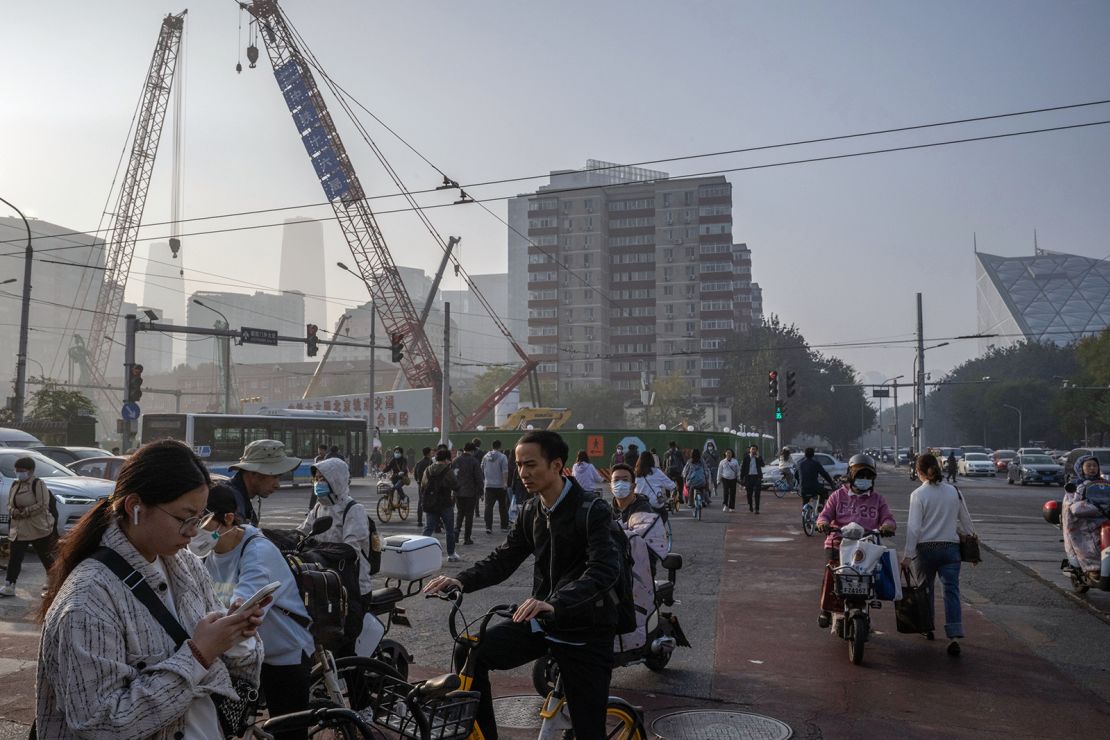Laura He

China’s top officials have pledged to put greater focus on economic growth next year, but the lack of measures to boost consumer demand could make it tough to deliver on that promise.
Beijing’s closely-watched annual Central Economic Work Conference (CEWC), which typically sets the tone for economic policy for the year ahead, ended late Tuesday with a commitment to “focus on the central task of economic development and the primary task of high-quality development,” according to a readout of the meeting.
“Next year, we must persist in seeking growth while maintaining stability, facilitating stability through growth, and building the new before breaking the old.”
The meeting, which was hosted by President Xi Jinping, was more “pro-growth” than in previous years, said Larry Hu, chief China economist at Macquarie Group.
With a more “proactive” tone, policymakers may set “4.5-5%” or “around 5%” as the GDP growth target for next year, Hu said, broadly similar to the goal for 2023.
But other analysts questioned whether this level of growth could be achieved without stimulus measures directly targeting consumers, which was not mentioned.
“[There was] no hint for massive consumption support policies,” Citi analysts said Wednesday. “There was no detailed discussion on increasing household income.”
The world’s second largest economy is facing deepening troubles, with weak consumption a major drag.
Policymakers have repeatedly pledged to expand domestic demand and spur consumer spending. But there hasn’t been any large-scale stimulus, despite economists and government advisors calling for more aggressive measures.
“We think [the 5% level] would be very challenging to achieve, given the lingering growth headwinds and the modest policy support stance set in the Conference,” UBS analysts said. They predict growth will slow to 4.4% next year.

Morning commuters passing through a construction site in Beijing on Monday, October 30, 2023.
Fighting deflation
Besides consumption, falling prices are a major concern and policymakers seem to have acknowledged the problem for the first time in years.
China has been fighting weak prices for most of this year due to the property market slump and weak spending. Deflation is bad for the economy because consumers and companies may put off purchases or investments in anticipation of prices falling further. That in turn could further slow the economy, and create a vicious cycle.
“Total social financing and money supply should be in line with economic growth and the price target,” said the readout, referring to the total amount of financing to the real economy.
Increasing the supply of money is one tool central banks can use to fight deflation.
“It’s the first time for them to add ‘the price target’ [to the readout], ” Hu said. “In other words, monetary policy could turn more accommodative in the face of deflationary risks.” That would imply interest rate cuts to come in the months ahead, he added.
Last month, the Consumer Price Index dropped 0.5%, its biggest fall since the depths of the pandemic three years ago. The drop marked an acceleration in the rate of deflation from October, which fell 0.2% from a year earlier.
The Communist Party’s top officials said their number one priority was to build a modern industrial system with “technological innovation.”

A woman selects clothes at a shopping mall in Beijing on June 15, 2023.
Building is back?
The readout from the CEWC also removed the phrase “houses are for living in, not for speculation” for the first time since 2018.
Chinese leaders started using the phrase in 2016, when they began tightening rules for the property market. In July, the Politburo dropped the phrase from the statement of its monthly meeting, sending a signal that some property curbs could be lifted.
“Property market stabilisation takes on more urgency,” HSBC analysts said on Wednesday, adding that there are signs the property market crisis is spilling over to the broader economy, including to financial markets and consumer confidence.
In the statement, the CEWC reiterated the importance of resolving risks in “real estate, local government debt, and small and medium-sized financial institutions.”

The offices of Zhongrong International Trust, a company partially owned by Zhongzhi Enterprise Group, in Beijing on August 22, 2023.
The government will accelerate construction in three major areas — affordable housing, urban-village redevelopment and public infrastructure facilities — to shore up activity in the property sector, it added.
The real estate slump is at the center of many of China’s current economic problems. The industry, which has accounted for as much as 30% of the GDP, fell into crisis three years ago, after the government cracked down on developers’ reckless borrowing.
Home sales have plunged, and many developers are struggling with a cash crunch. Their debt woes have spilled over to the massive shadow banking system, including trust firms, which has lent extensively to developers over the years.
No comments:
Post a Comment